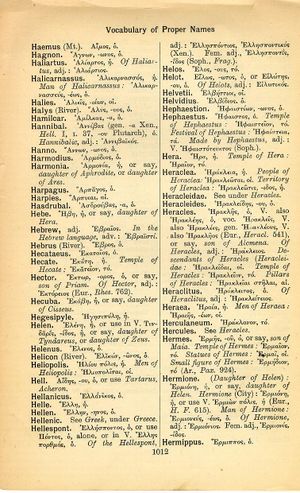Hera: Difference between revisions
ἀμήχανον δὲ παντὸς ἀνδρὸς ἐκμαθεῖν ψυχήν τε καὶ φρόνημα καὶ γνώμην, πρὶν ἂν ἀρχαῖς τε καὶ νόμοισιν ἐντριβὴς φανῇ → hard it is to learn the mind of any mortal or the heart, 'till he be tried in chief authority | it is impossible to know fully any man's character, will, or judgment, until he has been proved by the test of rule and law-giving
m (Text replacement - "}}]]" to "}}]]") |
m (Text replacement - "link={{" to "link={{") |
||
| Line 1: | Line 1: | ||
{{WoodhouseENELnames | {{WoodhouseENELnames | ||
|Text=[[File:woodhouse_1012.jpg|thumb | |Text=[[File:woodhouse_1012.jpg|thumb | ||
|link= | |link={{filepath:woodhouse_1012.jpg}}]]Ἥρα, ἡ. | ||
<b class="b2">Temple of Hera</b>: Ἡραῖον, τό. | <b class="b2">Temple of Hera</b>: Ἡραῖον, τό. | ||
Revision as of 10:09, 15 August 2017
English > Greek (Woodhouse)
Ἥρα, ἡ.
Temple of Hera: Ἡραῖον, τό.
Latin > English (Lewis & Short)
Hēra: ae, f., = Ἥρα,
I another name of Hybla Minor in Sicily, Cic. Att. 2, 1, 5.
Hēra: ae, f., = Ἥρα,
I the Grecian goddess Hera, corresp. to the Juno of the Romans, Sol. 2, 10; Inscr. Orell. 2225 (although here, perh., HERA is i. q. FORTVNA). —
II Deriv.: Hēraea, ōrum, n., = Ἡραῖα, τά, the festival of Hera, Liv. 27, 30, 9 sq.
Latin > French (Gaffiot 2016)
(2) Hēra, æ, f. (Ἥρα),
1 la déesse Héra [Junon chez les Romains] : Sol. 2, 10
2 v. de Sicile : Cic. Att. 2, 1, 5.
Latin > German (Georges)
(2) Hēra2, ae, f. (Ἥρα), die Göttin Hera der Griechen, die Juno der Römer, Solin. 2, 10. – Dav. Hēraea, ōrum, n. (Ἡραια), das Herafest (mit öffentlichen Spielen verbunden), Liv. 27, 30, 9.

